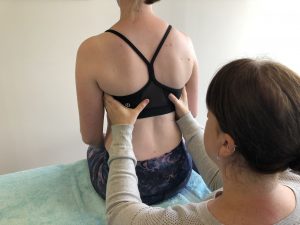If you want to make sure you get your body back after having a baby then book a Postnatal Check. This is a one hour physiotherapy assessment with one of our women’s health physios and it has been designed to ensure you recover from pregnancy and delivery as well as you possible.
In this one hour session we aim to include:
- Real Time Ultrasound scan of your abdominal muscles to ensure you can properly activate them.
- Assessment of rectus diastasis (abdominal separation) and fascial integrity
- Pelvic floor assessment
- Prolapse assessment
- Assessment of alignment of thorax (rib cage) and pelvis.
What to expect
When we do a Real Time Ultrasound scan we look at your bladder and we look at the way you use your stomach muscles. To do this most effectively it is helpful if your bladder is not empty. You don’t need to have a full bladder – there simply needs to be some urine in the bladder so try to avoid going to the toilet when you arrive at the clinic.
Not everyone wants a pelvic floor assessment and that’s totally up to you. Pelvic floor assessments can be performed internally or to some extent externally. During a pelvic floor assessment, the physio will check the muscle tone as some of these muscles can be either too switched (too tight) on or not switched on enough (too weak) – or both! Our physios will then check how well you can perform a pelvic floor contraction and check for any prolapses.
How strong your pelvic floor is and what condition it’s in after delivery can impact when you can return to sports. Some sports, like running, can lead to leaking and damage to the tissue that holds your bladder up if your pelvic floor is not doing its job. So, if you’re into sports, or you like to work out, your pelvic floor resting tone is also something really important to assess.
The physio will also assess your rib cage and pelvic alignment postnatally because it can greatly impact your ability to get your abdominal muscles working again and so that you can recover your normal stomach muscle function and recover from stomach muscle separation issues.
Lots of women complain about having a mummy tummy they can’t get rid of. If there is a twist in the rib cage and/or a twist in the pelvis, it can create pressure in your abdomen that gives you the belly bulge. The faster you identify any issues in the rib cage and/or pelvis postnatally the faster you will get your stomach back. Getting tension on the linea alba (the tissue in the abdominal separation) is extremely important in preventing back and pelvic pain long term.
As you can see there’s quite a lot we try to cover in the session and unfortunately we can’t always get through it all – although we do aim to do so. Sometimes, because pregnancy puts such an enormous strain on your body, it can impact some areas more than others. For example, sometimes women really struggle with their stomach muscles postnatally and when we’re working with you, we really want to make sure we assess your abdomen thoroughly to help you get the best result possible rather than rushing through the assessment to try and cover everything in one session. So while we endeavour to do our best to assess everything in one session, sometimes this is not possible and it needs to be spread over two sessions.





